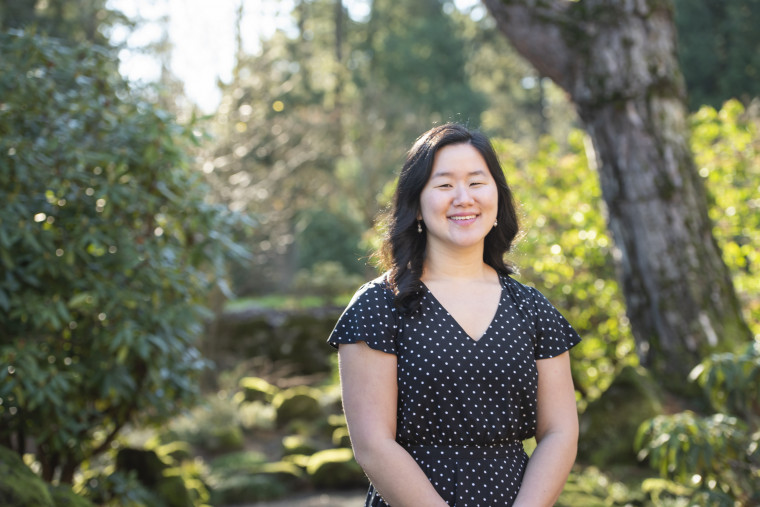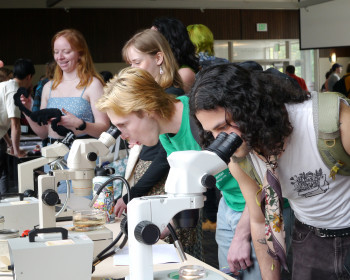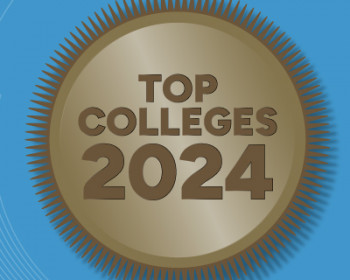Sarah Lind-MacMillan
LC also gave me some of the most amazing, inspiring, and dedicated professors who were invaluable resources and supporters (and still are!).

Pronouns
Degree and Class Year
Current City
Major
Extracurriculars
Job Title, Organization
Internship
Continuing Studies
What three words would you use to describe L&C?
What made you want to come to Lewis & Clark?
I wanted to find a close-knit community where I could thrive in and out of the classroom. I wanted to be able to personally get to know faculty and be active in lots of communities across campus. I did not want to be lost in the sea of tens of thousands of students, I wanted to really know the people around me. The Pacific Northwest was also a considerable pull because of the diverse biomes with easy access to mountains, oceans, and deserts.
What have you been doing since graduation?
After graduation, I spent the summer interning in Washington, D.C. with the U.S. House Foreign Affairs Subcommittee on International Development as a component of the Charles B. Rangel Graduate Fellowship. Upon completion of my time on Capitol Hill, I returned to Minneapolis, Minnesota, where I took a much-needed break from school on a gap year. I worked at the Minneapolis Bouldering Project and also remotely for Lewis & Clark Admissions. This summer I am interning abroad at the U.S. Embassy in Bangkok, Thailand, supporting the work of the Political Affairs section covering issues ranging from elections and democracy to human rights and trafficking in persons. Next, I will head back to Washington, D.C. to begin my graduate program in Asian Studies at Georgetown University.
How did Lewis & Clark prepare you for post-college life?
Lewis & Clark allowed me to obtain a breadth of knowledge in the classroom that was applicable to the internships and jobs I have had. The emphasis on reading and writing in my coursework at LC has allowed me to move seamlessly into professional research and policy roles which require advanced writing capabilities. LC also gave me some of the most amazing, inspiring, and dedicated professors who were invaluable resources and supporters (and still are!). By being able to meet with my professors weekly and take multiple classes with them, I was able to build important relationships and learn about new opportunities that related to my specific interests and skill set.
What would you say is the most important thing you learned at Lewis & Clark?
Community-centered care and advocacy.
Why did you major in International Affairs?
I came into LC knowing I would major in International Affairs because I wanted to learn about how countries and people interact. I was interested in human rights and humanitarian intervention initially, but throughout the variety of coursework I took my interests came to include U.S.-China-Taiwan relations, religion’s role in politics, political economy, Southeast Asia, and much more.
If applicable, why did you choose a minor?
While I did not officially minor in Religious Studies, I took quite a few courses and found out that I really love it! My advice to you is to take some random classes because you never know it could be your new favorite thing. I realized that learning about the world through religion was fascinating and provided me with a worldview that I was not originally familiar with. Through courses, I learned about Hinduism, Buddhism, and the religious history of the PNW.
How do you stay connected to Lewis & Clark as an alum?
Mainly through staying connected to close friends, faculty, and staff. It has also been cool to experience the LC community beyond Portland. And of course, planning trips back to Portland to visit my community and help out at events.
How do you describe the liberal arts?
Personally, I still was not sure what the “liberal arts” entailed when I was walking to my first class of freshman year. However, eventually, I started to realize what it was. To me, the liberal arts are being able to take a wide variety of courses and form yourself into a well-rounded student and person. Moments when I thought “Wow, the liberal arts model is cool” are times when across the four different classes I was taking that semester, there would be themes or specific content that was applicable across the board. I would find something I learned in my history class was relevant to my Chinese class, or something I was learning in IA was relevant to my first-year seminar. Being able to make these connections of knowledge and apply them in different spaces is what the liberal arts are all about.
What was your favorite class? How did it expand your knowledge?
My all-time favorite class was Social Justice in the Global Economy with Professor Elizabeth Bennett. This class literally opened my mind and gave me the tools to understand complex systems of inequality around the world and the ability to identify solutions. It also inspired my International Affairs thesis and research I hope to do in graduate school on migrant labor in Southeast Asia. In a small seminar-style class, I was able to dive into discussion and push myself to synthesize large amounts of content. When I took it, it was a 3-hour course that met only once a week in the evening and I was never bored. It quickly became the class I looked forward to the most (even on Zoom when we had to abruptly transition at the beginning of the pandemic) and still to this day has had the most impact on me.
Where did you find your community on campus?
Since Lewis & Clark is a small school, it is easy to find your pocket of community and stick with it. While one may think the smallness is a limiting factor, it is quite the opposite. For me, I saw the smaller population of students as an environment where one can actually transcend the smaller social groups that form if one puts in a little effort to get to know a wider range of people. I found community in my New Student Trip group (of which became some of my best and closest friends). I found community in the different classes I took. I found community by joining the crew team which helped introduce me to students of all years and from all majors. I joined lots of different clubs and groups on campus which allowed me to be part of a wider community. One of my favorite things about LC is that on your way to class, you will pass by so many friends and people you know, but also plenty of people you don’t know.
More Admissions Stories
Admissions is located in Frank Manor House on the Undergraduate Campus.
MSC: 32
email admissions@lclark.edu
voice 503-768-7040
fax 503-768-7055
Vice President of Admissions and Financial Aid
Eric Staab
Admissions
Lewis & Clark
615 S. Palatine Hill Road MSC 32
Portland OR 97219

